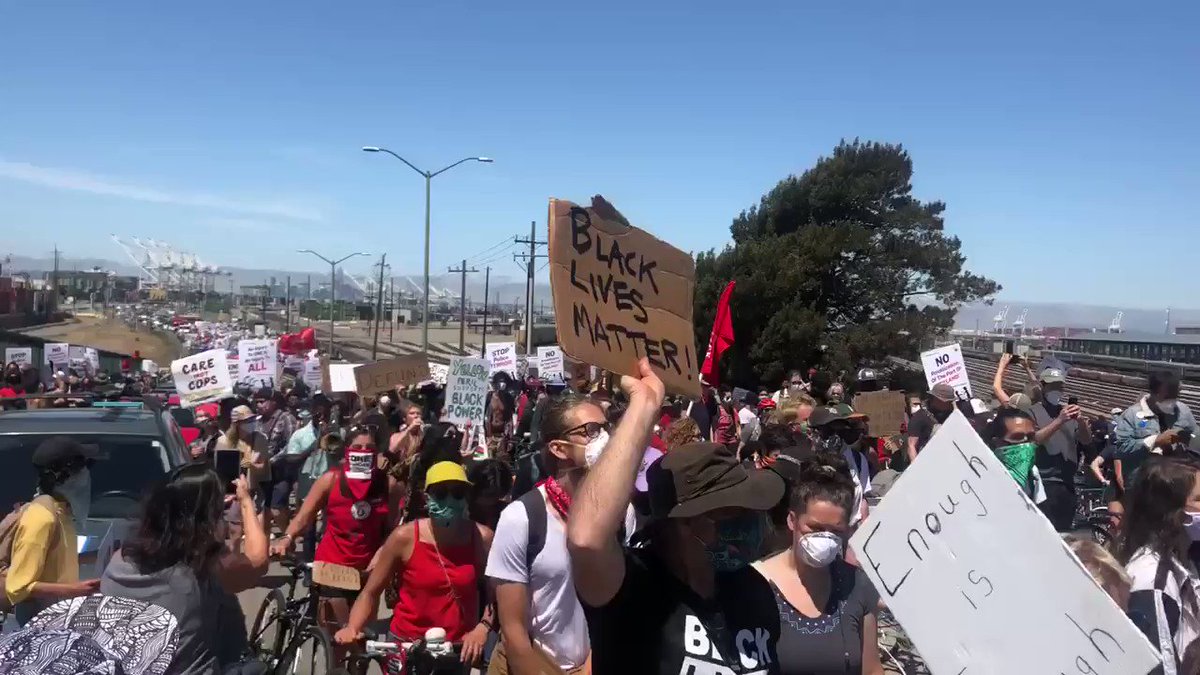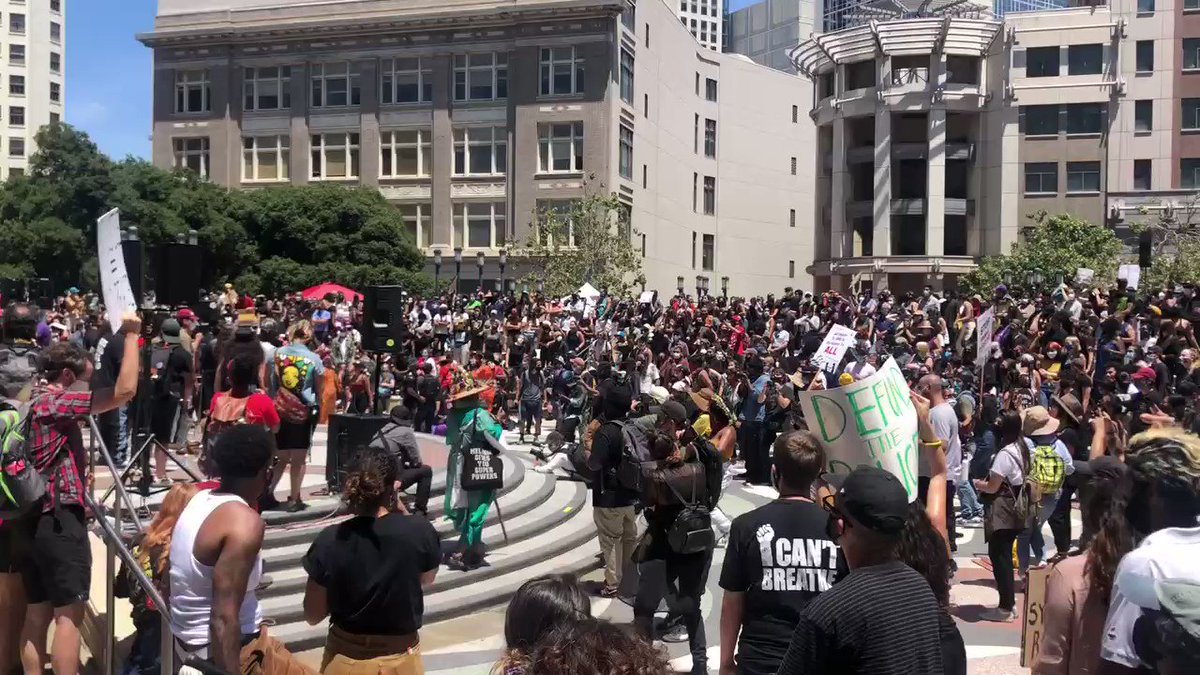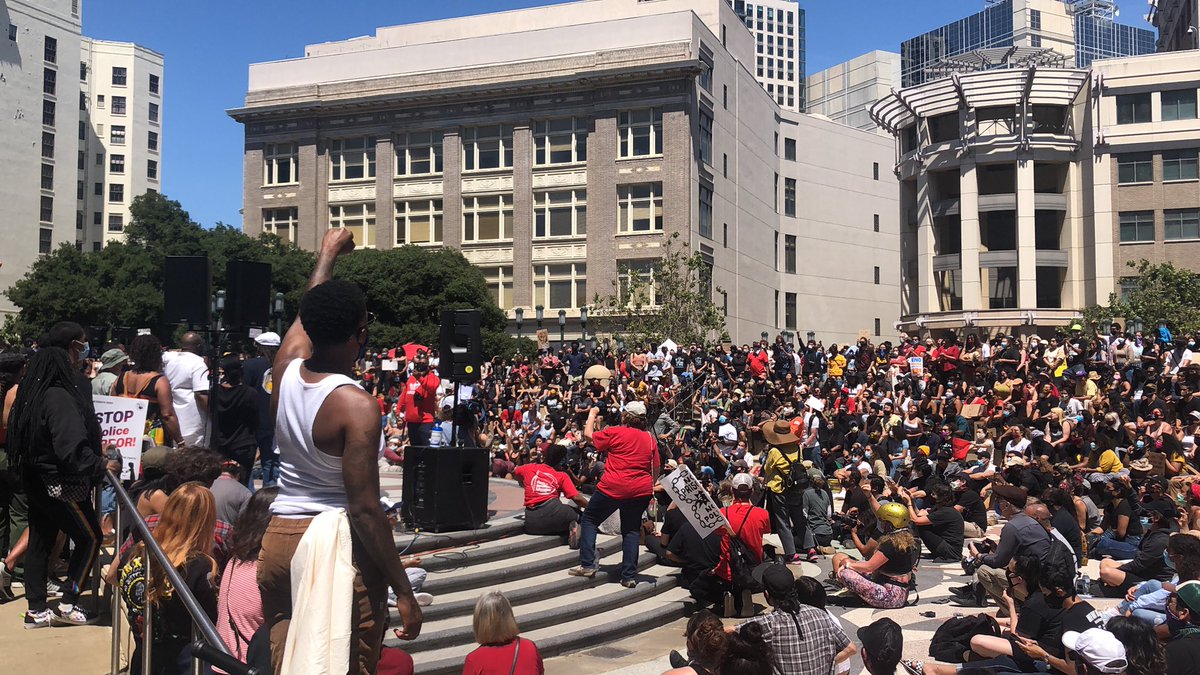Thousands of people filled the streets of Oakland on Friday, June 19 to honor Juneteenth and stand in solidarity with a huge shutdown of the Port of Oakland.
The International Longshore and Warehouse Union (ILWU) enacted the planned work stoppage at the Port of Oakland — along with the shutdown of all ports along the West Coast — to honor Juneteenth: the date when slaves in Texas learned that they were free in 1865, more than two years after slavery officially ended in the United States.
Protesters gathered at the port this morning to hear from Angela Davis and the relatives of Black people killed by police. Marchers then moved downtown — followed by a mile-long car caravan — to Oakland City Hall, where speakers including Boots Riley spoke with urgency of the need for momentum in the global fight against racism.
To those asking what the “next step” in the fight for justice was, Riley emphasized the power of labor organizing in that “question of power.” That, he said, was what the Juneteenth port shutdown was “answering”: “Because our power comes from the fact that we create the wealth. Wealth is power, we have the ability to withhold that power. We have the ability to withhold on labor, and shut shit down.”
“We don’t want to just ask for things to get better. We wanna say ‘it’s going to get better or else,’ ” he said.
Companies, Riley said, were “scared” of the threat of work stoppages. “What we need to do is: Wherever you work, wherever you are during the day, that’s where you need to be organizing — because we need to be able to shut this down. We need to show them we ain’t asking, we’re telling. And that we’ll stop the world and make them motherfuckers jump off.”

Friday’s protest was peaceful, and an overwhelming majority of attendees wore face coverings to limit the transmission of COVID-19, in accordance with a statewide order by Gov. Gavin Newsom.
The police presence at the event was also minimal. An Oakland Police Department spokesperson said that the ILWU provided their own security and monitored traffic and safety, and that OPD was “there only … if any type of medical emergency or if someone drove into the crowd.” No incidents were reported.
“Thank you for shutting down the ports today, on Juneteenth … the day when we renew our commitment to the struggle for freedom,” said civil rights icon, author and academic Angela Davis, one of the speakers that addressed the crowds at the port in the morning.

‘This Reaches Back to Me in Heritage’
This Juneteenth work stoppage represents the latest in a long line of protests enacted by ILWU, from anti-apartheid shutdowns to action taken against the Iraq war in 2008.
“With the ILWU’s history of advocating for the end of police terror and violence we decided to put a call out,” said Trent Willis, president of the ILWU Local 10 in San Francisco, said when the stoppage was announced.
Several of the port workers attended the Juneteenth rally in person to demonstrate solidarity with the shutdown. As thousands marched downtown, accompanied by music and chants, union members wearing orange vests helped to redirect traffic and handed out water to protesters.

ILWU Local 10 worker Elton Meyers emphasized the importance of direct action from unions to effect change: “When their pockets are hurting, that’s the only way to make them realize what’s going on and how serious the situation is.”
Kim Cotton, a Local 24 marine clerk from Oakland, was one of those union members directing cars on Martin Luther King Jr. Way, and said that she thought the majority of her colleagues had chosen to come to the protest. “We’re all human. Nobody’s no different. We’re taught race, color, hate,” she said.
On her own reasons for coming to the protest, Cotton said, “My great-grandmother’s mother was a slave. My great-grandmother worked in the fields. This reaches back to me in heritage, what’s been happening for years.”
Cameron Hamilton from Richmond, another ILWU Local 10 member, commented on the energy he saw in the rally, on the vibe: “People seem fierce. People seem energized, but at the same time calm, like they’ve done it before, like it’s second nature.”
The shutdown meant Hamilton and his fellow union members were going without pay for the day, he confirmed — but that choosing to do so was “not a hard decision.” Labor, he said, has “the people power, funds and infrastructure to lead a movement.”
Another of the speakers was Taun Hall, the mother of Miles Hall: a young Black man with schizoaffective disorder who was killed by police in Walnut Creek in 2019.
Also among the speakers was Pamela Price, an Oakland civil rights attorney. Nodding to the backdrop of a the coronavirus pandemic — one which has been proven to affect Black and Indigenous people of color disproportionately — she called racism in America “a public health crisis.”
‘We’re Done Looking Over Our Shoulders’
Marchers moved slowly throughout the morning towards downtown Oakland, followed by a car caravan that extended for roughly a mile behind them.
One of the youngest to take the stage was recent high school graduate Lauryn Campbell of Black Youth for the People’s Liberation, the youth-led group which worked to organize the June 8 East Oakland march in protest of the killing of Oakland man Erik Salgado by California Highway Patrol officers.
“Today we are here to say we’re done,” Campbell told the crowd. “We’re done hiding our Blackness. We’re done looking over our shoulders.”
Out in the crowd, Paul Williams of Oakland watched with his five children, aged between 4 and 13, who chanted “No justice, no peace” as they held their protest signs. Williams explained he wanted his kids to witness firsthand “how injustice can bring people together to create justice.”
Williams said he also wanted to make sure his family “understands the political and historical effects of racism … I want my children to definitely know and understand what’s happening.”
Another father at the Juneteenth march, James Cox, brought his 5-year-old daughter with him. “I think it’s important we teach our children the real history of our cultures when they’re young,” he said. “I don’t want to shield her from the reality of what it means to be a Black person in America.”
For Cox, these latest protests feel different — because of the amount of allies he sees in the streets. “For once, it doesn’t feel like just Black people. For white supremacy to end, white people have to do the work.”
Another marcher, Sami Smith, carried a handmade sign proclaiming “Filipinos for black power,” which she said was inspired by a photo she found from the 1960s of a little girl holding a similar sign. This Juneteenth rally was one of many protests Smith has attended in Oakland in the last weeks, and she admitted she found the first nights in the street “definitely tense, and a little scary. But one night the police ended up leaving before we did, and that was a turning point.”
‘This Is Our Independence Day’
Around the Bay Area, people are marking and celebrate Juneteenth this weekend with direct action.
When the coronavirus pandemic hit the Bay Area, and events everywhere announced their inevitable cancellation, the idea of June 19, 2020, passing without any major in-person gatherings to mark Juneteenth seemed to be a real possibility.
But this Juneteenth now falls after weeks of ongoing protests nationwide against the killing of Black people, including George Floyd, Breonna Taylor and Tony McDade — a movement which has seen direct action in support of Black lives continue night after night around the Bay Area. And while several of the major scheduled festivals aren’t happening this year, there’ll be protests, celebrations and commemorations taking place with a fresh urgency around the Bay Area today and into the weekend.
One such action includes the teenage members of Black Youth for the People’s Liberation. The collective held a Juneteenth event at DeFremery Park in West Oakland on Friday afternoon.
On Thursday, one of their founders, 17-year-old Isha Clarke, gathered her fellow activists in the park to make signs for the event, where she and others will be speaking before leading a march through West Oakland. All wore masks, to limit the potential to spread COVID-19.
“I was like, we need to do a Black youth led protest on Juneteenth,” said Clarke. “This is definitely a time to reclaim that holiday and to acknowledge that this is our Independence Day, it’s not the 4th of July.”
“We’re celebrating all of our ancestors and the people that came before us, who fought since the day they were kidnapped,” Clarke said. “And also acknowledging that we have so much more to do.”



